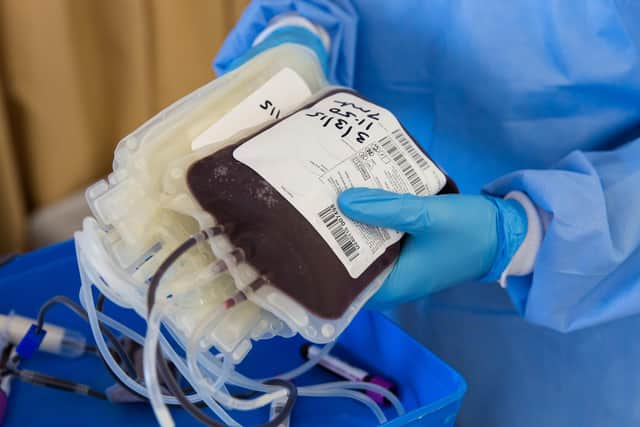More than 4,000 new blood donors needed across Hucknall and Nottinghamshire
and live on Freeview channel 276
Nationally, one million more blood donors are needed over the next five years to ensure patients receive the right type of blood to save and improve their lives, with a particular need for black African, black Caribbean and younger donors.
NHSBT figures show that in Ashfield, 1,637 people gave blood in the year to March, the lowest number since at least 2016, when figures are first available.
Advertisement
Hide AdAdvertisement
Hide AdThe five-year Blood Service Strategy, published as part of National Blood Week, sets ambitious plans to recruit up to a million new donors and double the number of regular donors with the rarest blood types.


This will ensure better matched blood types for patients in the future and reduce health inequalities.
Most people know the main blood types - O positive (35 per cent of the population), O negative (13 per cent), A positive (30 per cent), A negative (8 per cent), B positive (8 per cent), B negative (two per cent), and AB positive (two per cent).
But the public is less familiar with the many sub-types that can provide an even better match to improve their treatment.
Advertisement
Hide AdAdvertisement
Hide AdThere is a particular urgency for more donors of black African and black Caribbean ethnicity to treat people with sickle cell.
Sickle cell is the fastest growing genetic blood disorder in the UK and mostly affects people of black heritage.
It requires regular transfusions – most often with the specific blood sub type Ro.
Most patients are children, and demand for Ro blood is projected to double by 2025-26.
Advertisement
Hide AdAdvertisement
Hide AdFifty five percent of black blood donors have the Ro subtype compared to 2.4 per cent of donors from other ethnicities.
Stephen Cornes, director of blood supply at NHS Blood and Transplant, said: “Currently we can only meet around half of the demand for Ro blood through our existing donor base and demand for this rare blood type is rising.
"This means many sickle cell patients often receive less well-matched blood which, while clinically suitable, can pose a longer-term risk to patients who receive regular transfusions.
We urgently need new black African and black Caribbean donors to come forward and donate blood.
Advertisement
Hide AdAdvertisement
Hide Ad“In addition to the rarest blood types, we also need one million new donors over the next five years of all blood types.
"As the NHS treats more patients, we need to grow the total number of donors too.
“We carefully manage stocks to ensure we do not waste any precious blood.
"If you cannot get an appointment immediately it is because we have enough of your blood type right now.
Advertisement
Hide AdAdvertisement
Hide Ad"Please book for a later date or respond when we contact you.”
Appointments to donate blood are arranged based on a donors’ blood type to meet future patient needs.
Knowing your type is an essential part of being a next-generation donor.
A mass public campaign is being held this National Blood Week and throughout June to identify people with most needed blood types.
Advertisement
Hide AdAdvertisement
Hide AdYoung people and those of black African or black Caribbean heritage are being urged by the NHS to find out their blood type, by making their first donation at one of the many events being held at blood donor centres in England.
Dr Bola Owolabi, director of health inequalities at NHS England, said: “A shortage of blood donation from people of a black heritage often means that some patients don’t receive the best blood-type match and are therefore at risk of serious complications.
“Tackling healthcare inequalities is one of the NHS’ top priorities and increasing the number of black African and black Caribbean blood donors is crucial in improving outcomes for sickle cell patients especially.
“I would urge anyone who is able to give blood to come forward as soon as possible – you are vital in saving the lives of your neighbours, friends and communities who are battling this disease.”
Advertisement
Hide AdAdvertisement
Hide AdAttend a What’s Your Blood Type event or register today and book an appointment by clicking here, downloading the GiveBloodNHS app or by calling 0300 1232323.
Or if you are an existing donor and have not donated in a while, please book your next appointment, or keep checking back for future appointments.
